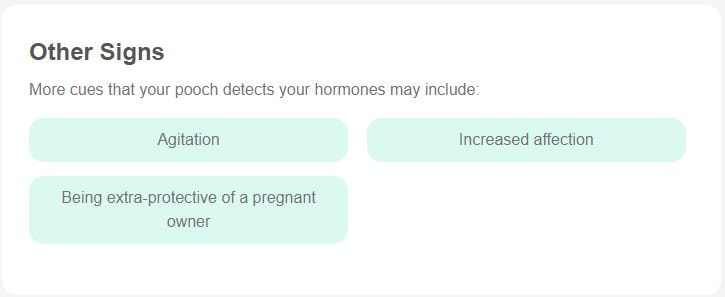Can Dogs Smell Hormonal Changes?
www.wagwalking.com
(This is a great site with Blog and a lot of interesting topics - enjoy!)

Introduction ; Dogs can sense when you're sad, when you're mad, and when you're just outright happy. Sometimes your dog understands your better than your parent, partner, or best friend. Your pup's unconditional love can go a long way with being in tune with your needs and desires.
Are our pups just incredibly intuitive? Or do they have something else helping them out? As you probably know, dogs have incredible noses.
Humans are often governed by internal hormones, which can contribute greatly to mood. Can our pooches actually smell these hormone changes?
Signs Your Dog Can Smell Hormonal Changes
Believe it or not, dogs are now being trained as medical detection assistants in order to sense medical crises before they happen! Scientists and trainers are only just beginning to realize how important a dog's sense of smell is and how we might be able to use them in health care.
For instance, dogs have the ability to sense changes in blood sugar levels, epileptic fits, allergic reactions, and narcolepsy. To add a cape to your pup's superpower, some farmers even train dogs to detect when a cow is in estrus to help with artificial insemination.
When a dog detects hormonal changes in their human, there are some signs you can read simply from your pup's behavior. For instance, a dog will raise its nose and tilt its head when trying to concentrate on sounds and smells in the environment. A dog will be relaxed and alert. If sniffing a new scent, expect a tail that is held high and not wagging.
When people are feeling scared, mad, or sad, our bodies may produce certain hormones, such as adrenaline. So it should come as no surprise that dogs can smell scents from these hormones and other body chemicals released. Keep a eye out for uncharacteristic behavior in your pup. Dogs may become distressed by uncommon smells. If your dog becomes more vocal, agitated, or stressed, something might be off.
Are our pups just incredibly intuitive? Or do they have something else helping them out? As you probably know, dogs have incredible noses.
Humans are often governed by internal hormones, which can contribute greatly to mood. Can our pooches actually smell these hormone changes?
Signs Your Dog Can Smell Hormonal Changes
Believe it or not, dogs are now being trained as medical detection assistants in order to sense medical crises before they happen! Scientists and trainers are only just beginning to realize how important a dog's sense of smell is and how we might be able to use them in health care.
For instance, dogs have the ability to sense changes in blood sugar levels, epileptic fits, allergic reactions, and narcolepsy. To add a cape to your pup's superpower, some farmers even train dogs to detect when a cow is in estrus to help with artificial insemination.
When a dog detects hormonal changes in their human, there are some signs you can read simply from your pup's behavior. For instance, a dog will raise its nose and tilt its head when trying to concentrate on sounds and smells in the environment. A dog will be relaxed and alert. If sniffing a new scent, expect a tail that is held high and not wagging.
When people are feeling scared, mad, or sad, our bodies may produce certain hormones, such as adrenaline. So it should come as no surprise that dogs can smell scents from these hormones and other body chemicals released. Keep a eye out for uncharacteristic behavior in your pup. Dogs may become distressed by uncommon smells. If your dog becomes more vocal, agitated, or stressed, something might be off.
The History Behind Dogs Sensing Hormonal Changes
Through domestication, dogs have become integrated into the household and are now true members of the family. Because of these intimate relationships we have built with our pups, dogs have become much more sensitive to changes in their humans. Dogs are very astute animals and are able to observe what’s happening around us. Our dogs know our habitual movements, expressions, and body language. Hormonal changes are often met with a lot of behavioral, emotional, and physical changes. This suggests that our dogs may know us even better than we do!
The Science Behind Dogs Smelling Hormones
Humans have about 6 million olfactory receptors in their noses. This allows you to recognize thousands of different smells. Dogs, on the other hand, have up to 300 million receptors in their noses. Even further, dog brains have a part of the brain devoted to analyzing smells, a part that is about 40 times larger in dogs than in human brains. Because of this, a dog’s sense of smell can be anywhere from 10,000 to 100,000 times sharper than the human sense of smell.
To put this incredible ability into perspective, a recent study found that "dogs are also able to detect prostate-cancer-specific volatile organic compounds in the urine of prostate cancer patients with 98 percent accuracy."
There is a common understanding in the veterinary and scientific community that dogs can detect changes in human hormones at a subconscious level. Our pups are highly sensitive to human behavior and hormones. A dog is able to pick up on human changes in behavior very quickly and further recognize the change in hormones. Doctor's urge that the idea of dogs reacting to both human scent, hormones, and changes in behavior is not unusual.
Although studies have proven that dogs can detect cancer in people, researchers still don't fully understand exactly what chemical compounds the dogs are sensing.
We still have a way to go to discover exactly what dogs are smelling about us, let alone how we can train them to be accurate. Although there is much to be studied, one thing is certain: dogs have a superpower ability to sniff out certain hormonal changes in people, which can ultimately be used to save lives.
Through domestication, dogs have become integrated into the household and are now true members of the family. Because of these intimate relationships we have built with our pups, dogs have become much more sensitive to changes in their humans. Dogs are very astute animals and are able to observe what’s happening around us. Our dogs know our habitual movements, expressions, and body language. Hormonal changes are often met with a lot of behavioral, emotional, and physical changes. This suggests that our dogs may know us even better than we do!
The Science Behind Dogs Smelling Hormones
Humans have about 6 million olfactory receptors in their noses. This allows you to recognize thousands of different smells. Dogs, on the other hand, have up to 300 million receptors in their noses. Even further, dog brains have a part of the brain devoted to analyzing smells, a part that is about 40 times larger in dogs than in human brains. Because of this, a dog’s sense of smell can be anywhere from 10,000 to 100,000 times sharper than the human sense of smell.
To put this incredible ability into perspective, a recent study found that "dogs are also able to detect prostate-cancer-specific volatile organic compounds in the urine of prostate cancer patients with 98 percent accuracy."
There is a common understanding in the veterinary and scientific community that dogs can detect changes in human hormones at a subconscious level. Our pups are highly sensitive to human behavior and hormones. A dog is able to pick up on human changes in behavior very quickly and further recognize the change in hormones. Doctor's urge that the idea of dogs reacting to both human scent, hormones, and changes in behavior is not unusual.
Although studies have proven that dogs can detect cancer in people, researchers still don't fully understand exactly what chemical compounds the dogs are sensing.
We still have a way to go to discover exactly what dogs are smelling about us, let alone how we can train them to be accurate. Although there is much to be studied, one thing is certain: dogs have a superpower ability to sniff out certain hormonal changes in people, which can ultimately be used to save lives.
|
Whether we’re hitting the beach, taking the field at a ball game, or simply heading out to run errands, we know that during the summer months wearing sunscreen is key to our health and safety. But what about our four-legged, furry friends?
|
Bone broth for dogs has been gaining popularity lately, following claims that it is a nutrient dense “superfood” that can help improve your dog’s immune system and joint health, among other things.
|
Shock collars are nothing more that abuse - they will not stop the behaviour as the cause of the behaviour has not been examined, plus the dogs will be extremely stressed and the chances of other inappropriate behaviours occurring is high.
|







